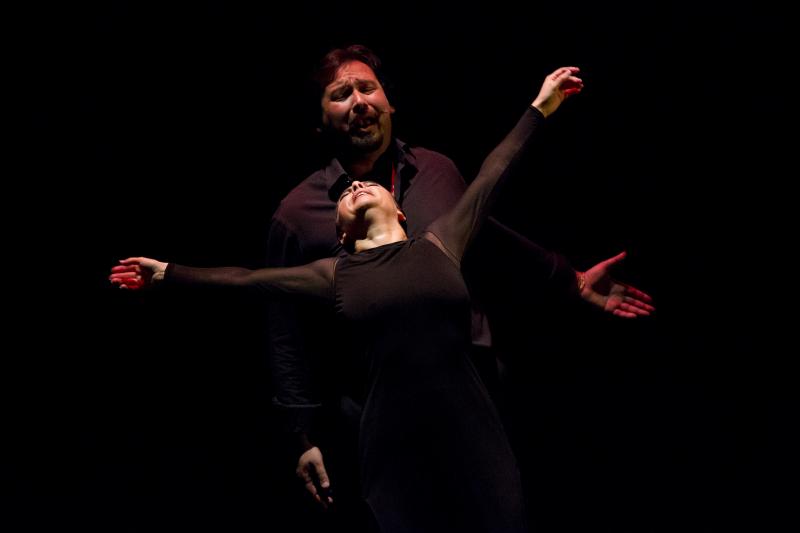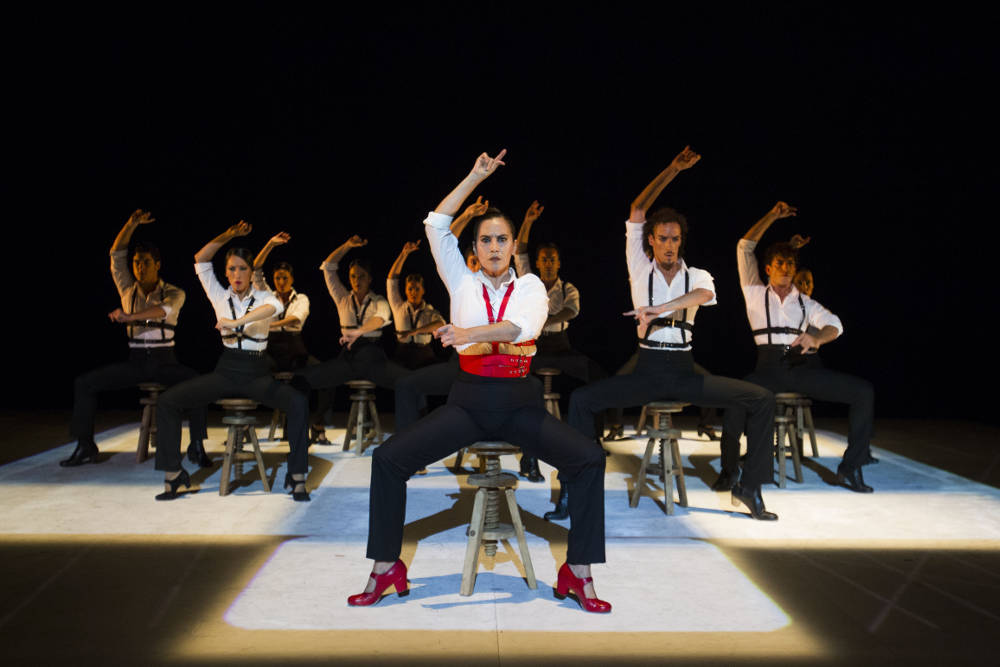Eva Yerbabuena/Ballet Flamenco de Andalucía, Sadler's Wells | reviews, news & interviews
Eva Yerbabuena/Ballet Flamenco de Andalucía, Sadler's Wells
Eva Yerbabuena/Ballet Flamenco de Andalucía, Sadler's Wells
Grimly majestic femininity steals the show at annual Spanish showcase

The Sadler's Wells Flamenco Festival is cunningly scheduled for that particularly dreary fortnight in late February when winter has been going on forever, spring is still just out of reach, and half term brings the dismal realisation that we're only just halfway through the school year and summer holidays are still at least five months away.
It's come a long way since then, of course, and the flamenco stars imported by Sadler's Wells are no "gypsies" from the Granadan hinterland but professional artists embedded in a highly developed disciplinary tradition which has flourished and diversified in response to international influences over the last decades. A tourist brochure vocabulary of "authenticity", "folk culture" and (oh dear) "gypsy soul" won't serve here: flamenco doesn't give itself up that easily. For one thing, it's brimming with poetry – in its song lyrics – that remains almost entirely opaque to the non-Hispanophone spectator, who will get only a very partial experience of the art form if no translation is provided (and, frustratingly, they rarely are).
Valencia's hands reach out delicately to spin us a storyEva Yerbabuena is one of those performers who come close to overcoming the language barrier through sheer force of personality. A grimly magnetic woman, in the first minutes of her show ¡Ay! last night she had me scribbling comparisons with both Queen Victoria and Picasso's Weeping Woman, as she stalked, haughty and black-clad, in and out of a harsh spotlight that etched her face in cubist shadows. Whatever José Valencia was singing at her can't have been happy: tense and trembling, Yerbabuena moved with the sudden, metallic sharpness of a twanged guitar string, collapsing into brittle, contorted shapes. This uncompromising bleakness set the tone for the whole show, which consists of seven vignettes or sections, whose cryptic titles ("From Sideways", "Nana and Coffee") are our only verbal clue to the content of the songs.
Yerbabuena uses her mesmerising stage presence to hypnotise even when she is doing little but revolve her torso slowly, windmill-like, in a skew-whiff chair, or climbing the same chair like a ladder, as if reaching for the unreachable. And when she does dance it's almost disdainful; she doesn't even always bother to lift her black dress to display the feet we can hear drumming out blistering rhythms. A later sequence in which the three male singers surround her with the air of lewd hecklers is remarkable precisely for the casual indifference with which Yerbabuena performs for them, throwing out her hips and planting her feet wide apart, all the while daring them, with an expression of cold fury, to get any pleasure from it. She's a handsome woman, but she rarely allows us to see it: light usually comes from the sides or above, hitting her face at an angle that leaves her expression a jumble of dark lines, like a charcoal sketch. It's almost a relief when she exits and leaves the stage to the musicians: in fact, one of the show's most straightforwardly engaging moments is a song sung by Valencia (accompanied by the very fine guitarist Paco Jarana). Valencia's whole heavy-set frame is alive with the song: open-faced and with a dancer's grace he gives it to us in gesture as well as music, his hands reaching out delicately to spin a story that his sheer expressiveness brings almost within reach. He and Yerbabuena (whose final dance solos are virtuosically intense) make it quite clear that costumes, sets, and frills of all kinds are only secondary (or even dispensable) requirements when you have in your soul a direct line to the aching pulse of human existence.

Ballet Flamenco de Andalucía's show on Friday night, Images: 20 Years was a different sort of proposition altogether: an ensemble show of polished theatricality made up of excerpts from the company's back cataloque restaged by new director Rafaela Carrasco, in general balancing finely on the line between striking and hackneyed. The opening number, "Del Maestro" (pictured above), featured chair-dancing of precision synchronicity, all the more impressive for the technical challenge to the dancers of doing complex foot-percussion while sitting down (it takes serious core control and hip flexor strength to drum both heels on the floor when seated – try it). The shirts and braces costumes even managed to avoid looking too like A Chorus Line; indeed, Ms Carrasco in the solo role is the antithesis of an identikit Busby Berkeley babe, a tough, womanly figure whose ample thighs and hips remind us that flamenco is one of those rare and wonderful dance forms in which it's a positive virtue not to be a slender stripling in her twenties.
It's this same aura of confident womanhood as possessed by a different soloist (whose name I could not work out from the limited programme information) that helped lift the next scene beyond its clichéd premise of lanterns, moonlight, and a not-quite-perfect romance, though it must be said that David Coria's testosterone-drenched good looks also beguiled the eyes. The rest was less memorable – though Carrasco's solo in an enormous white traje (skirt) stood out, as did that of another female soloist in hot pink. She took us into a mesmerising vortex of rhythm and ruffles with a charisma that was only fleetingly echoed in the final segment's evocation of railway porters dance-jamming, 30s-style on mercifully robust wooden suitcases.
Accomplished and effective though the Andalusians' design and execution was, the whole show left me far colder than the difficult, dark, raw 90 minutes in Eva Yerbabuena's uncompromising presence. The beauty of the fortnight-long festival, of course, is that both flavours of flamenco, and many others besides, were on offer to help us banish our English February blues – if only by replacing them with even deeper blues of an Iberian flavour.
- The Sadler's Wells Flamenco Festival continues until 1 March
rating
Explore topics
Share this article
The future of Arts Journalism
You can stop theartsdesk.com closing!
We urgently need financing to survive. Our fundraising drive has thus far raised £49,000 but we need to reach £100,000 or we will be forced to close. Please contribute here: https://gofund.me/c3f6033d
And if you can forward this information to anyone who might assist, we’d be grateful.

Subscribe to theartsdesk.com
Thank you for continuing to read our work on theartsdesk.com. For unlimited access to every article in its entirety, including our archive of more than 15,000 pieces, we're asking for £5 per month or £40 per year. We feel it's a very good deal, and hope you do too.
To take a subscription now simply click here.
And if you're looking for that extra gift for a friend or family member, why not treat them to a theartsdesk.com gift subscription?
more Dance
 'We are bowled over!' Thank you for your messages of love and support
Much-appreciated words of commendation from readers and the cultural community
'We are bowled over!' Thank you for your messages of love and support
Much-appreciated words of commendation from readers and the cultural community
 R:Evolution, English National Ballet, Sadler's Wells review - a vibrant survey of ballet in four acts
ENB set the bar high with this mixed bill, but they meet its challenges thrillingly
R:Evolution, English National Ballet, Sadler's Wells review - a vibrant survey of ballet in four acts
ENB set the bar high with this mixed bill, but they meet its challenges thrillingly
 Like Water for Chocolate, Royal Ballet review - splendid dancing and sets, but there's too much plot
Christopher Wheeldon's version looks great but is too muddling to connect with fully
Like Water for Chocolate, Royal Ballet review - splendid dancing and sets, but there's too much plot
Christopher Wheeldon's version looks great but is too muddling to connect with fully
 iD-Reloaded, Cirque Éloize, Marlowe Theatre, Canterbury review - attitude, energy and invention
A riotous blend of urban dance music, hip hop and contemporary circus
iD-Reloaded, Cirque Éloize, Marlowe Theatre, Canterbury review - attitude, energy and invention
A riotous blend of urban dance music, hip hop and contemporary circus
 How to be a Dancer in 72,000 Easy Lessons, Teaċ Daṁsa review - a riveting account of a life in dance
Michael Keegan-Dolan's unique hybrid of physical theatre and comic monologue
How to be a Dancer in 72,000 Easy Lessons, Teaċ Daṁsa review - a riveting account of a life in dance
Michael Keegan-Dolan's unique hybrid of physical theatre and comic monologue
 A Single Man, Linbury Theatre review - an anatomy of melancholy, with breaks in the clouds
Ed Watson and Jonathan Goddard are extraordinary in Jonathan Watkins' dance theatre adaptation of Isherwood's novel
A Single Man, Linbury Theatre review - an anatomy of melancholy, with breaks in the clouds
Ed Watson and Jonathan Goddard are extraordinary in Jonathan Watkins' dance theatre adaptation of Isherwood's novel
 Peaky Blinders: The Redemption of Thomas Shelby, Rambert, Sadler's Wells review - exciting dancing, if you can see it
Six TV series reduced to 100 minutes' dance time doesn't quite compute
Peaky Blinders: The Redemption of Thomas Shelby, Rambert, Sadler's Wells review - exciting dancing, if you can see it
Six TV series reduced to 100 minutes' dance time doesn't quite compute
 Giselle, National Ballet of Japan review - return of a classic, refreshed and impeccably danced
First visit by Miyako Yoshida's company leaves you wanting more
Giselle, National Ballet of Japan review - return of a classic, refreshed and impeccably danced
First visit by Miyako Yoshida's company leaves you wanting more
 Quadrophenia, Sadler's Wells review - missed opportunity to give new stage life to a Who classic
The brilliant cast need a tighter score and a stronger narrative
Quadrophenia, Sadler's Wells review - missed opportunity to give new stage life to a Who classic
The brilliant cast need a tighter score and a stronger narrative
 The Midnight Bell, Sadler's Wells review - a first reprise for one of Matthew Bourne's most compelling shows to date
The after-hours lives of the sad and lonely are drawn with compassion, originality and skill
The Midnight Bell, Sadler's Wells review - a first reprise for one of Matthew Bourne's most compelling shows to date
The after-hours lives of the sad and lonely are drawn with compassion, originality and skill
 Ballet to Broadway: Wheeldon Works, Royal Ballet review - the impressive range and reach of Christopher Wheeldon's craft
The title says it: as dancemaker, as creative magnet, the man clearly works his socks off
Ballet to Broadway: Wheeldon Works, Royal Ballet review - the impressive range and reach of Christopher Wheeldon's craft
The title says it: as dancemaker, as creative magnet, the man clearly works his socks off
 The Forsythe Programme, English National Ballet review - brains, beauty and bravura
Once again the veteran choreographer and maverick William Forsythe raises ENB's game
The Forsythe Programme, English National Ballet review - brains, beauty and bravura
Once again the veteran choreographer and maverick William Forsythe raises ENB's game

Add comment